Indigenous people and nature conservation
Dubbed one of the world’s top-two mega centers of biodiversity alongside Brazil, Indonesia is also a country of enormous cultural diversity
Change text size
Gift Premium Articles
to Anyone

D
ubbed one of the world’s top-two mega centers of biodiversity alongside Brazil, Indonesia is also a country of enormous cultural diversity. Among its 259.94 million inhabitants today, there are more than 500 ethnic groups speaking over 1,000 languages and dialects.
Anthropological studies indicate that hot spots of high biodiversity are associated with regions where traditional societies are frequently found. In this circumstance, indigenous groups offer alternative knowledge and perspectives based on their own locally developed practices of resource use (Berkes et al, 2000) or known as the indigenous knowledge — practice belief complex.
Indigenous knowledge and biodiversity are complementary phenomena essential to human development. During the past decade, a rapidly growing set of evidence indicates strong relations between indigenous knowledge and sustainable development.
Recent studies show that indigenous knowledge of ecological zones, natural resources, agriculture, aquaculture, forest and game management, to be far more sophisticated than previously assumed. Furthermore, this knowledge offers new models for development that are both “ecologically and socially sound” (Posey 1985:139-140).
This is confirmed by the growing of interest in indigenous knowledge in recent years, partly due to a recognition that such knowledge can contribute to the conservation of biodiversity; rare species; protected areas; ecological processes and to sustainable resource use in general.
Further it was developed into a working definition of indigenous ecological knowledge as a cumulative body of knowledge, practice and belief, evolving by adaptive processes and handed down through generations by cultural transmission, about the relationship of living beings (including humans) with one another and with their environment.
Comprehensive information is less available in Indonesia, although articles on indigenous ecological knowledge and nature conservation in Sumatra, Kalimantan, Sulawesi, Nusa Tenggara, Maluku and Papua have been widely published.
Panglima Laot in Aceh for example, is considered as one of the old traditional-based fisheries management in the world that still exists. It is a fishers’ institution which has played a dominant role in governing the fisheries and coastal management in Aceh for over four centuries through the strict implementation of “adat laot” (marine customary law).
Dayak Benuaq ethnic group from Kalimantan practices a traditional land use system, such as the “karet” system, where farmers have incorporated the exotic rubber trees but allowed natural vegetation to grow unrestricted. Within these systems, a wide range of commodities like building materials, vegetables, medicines, wild animals and firewood are possibly extracted.
The Lamalera people in Lembata islands are the one and only community in Indonesia to hold customary law (adat) regarding whale hunting as part of a traditional subsistence fishery. As traditional whalers, they have a series of traditions and customs related to their lives, starting with the making of special vessels for whaling, known as pelédang, equipped with specific gear, and a system of rules of engagement including proscription and taboos relating to fishing, as well as special ways of dividing the catch.
Previously, a large body of evidence shows that in most Indonesia’s cultures and societies, indigenous peoples have successfully cultivated and inhabited areas with a high degree of diversity. This was possible, in part, because they were practitioners of environmental processes designed to transform, manage and use nature, in order to conserve it.
Nearly everyone accepts the need for some form of conservation and most cultures have their own conservation ethic.
They knew that in many cases their survival — especially in coastal sites, tropical forest and crop land — depended on the diversity of the ecosystems.
The indigenous knowledge accumulated by these peoples and communities constitutes a reservoir of adaptations that are of great importance for long-term sustainability.
In reality, cultural diversity and biological diversity are two sides of the same coin. Living diversity in nature corresponds to a living diversity of cultures. It is also important to notice that the use of traditional ecological knowledge in the form of customary ecological management practices has been recognized as a potentially powerful conservation mechanism, particularly in countries where indigenous cultures are still largely extant.
However, with cultural and environmental changes, both biodiversity and the indigenous knowledge systems vital to sustainability are being lost at an incredible rate. In addition, traditional methods of utilizing biodiversity also fail to uplift living standards.
For example, many commercial products, including medicines that are derived from traditional knowledge of tropical biodiversity, are developed and commercially patented and traded by giant companies. Ironically, there are no benefits for the people who traditionally have been developing and utilizing the same products. Consequently, the living conditions of indigenous people in forest areas have become worse as these people become more marginalized.
In the light of all the above challenges, it is time for the government to take action if this system of indigenous resource management system is to be maintained. It is generally agreed that indigenous knowledge, technology and heritage cannot survive in this changing environment unless the government has the political will to protect them.
It is also urgent to call for the government to increase support for traditional ecological knowledge aspects of managing resources and ecosystems.
Despite repeated calls for increased use of traditional knowledge in conservation and development, integration of traditional knowledge in natural resource planning and management remains nominal or negligible at best.
On the other hand, traditional knowledge can be used to assist in interpreting and responding to feedback from the environment and guiding development.
Indonesia has more than 100 existing national laws and regulations related to natural resources management from various ecosystems. However, the lack of capacity, coordination and understanding of the essence of the related laws by local government officials to some extent hinder the enforcement of the law.
Furthermore, in terms of coordination, as many as 34 ministries and agencies in Indonesia have, to some degree, the function to manage nature’s conservation among their tasks. Therefore, the problem of overlapping, coordinating and sectoral interests is very prominent in discussing nature conservation in Indonesia.
Another important issue is community support for conservation plans consistently emerges as one of the most important factors in maintaining the plans’ long-term efficacy. Therefore, programs that incorporate customary ecological management practices in their design draw more support from local peoples.
Regrettably, there is still no explicit regulation related to community-based management in the laws. For example, in Law No. 27/2007 on coastal management and small islands, it is only stated in Article 28 (7) that the initiation of conservation areas can come from the individual and community, without any further stipulations.
In fact, locally based management can have beneficial impacts for the environment and that, in comparison, community-based management plans tend to work better than top-down, centralized government programs on natural resources management.
For that reason, the government needs to work shoulder-to-shoulder to integrate indigenous knowledge into the proposed development program. Doing so will not only improve accountability and legitimacy of the approaches taken but will also strengthen and increase capacity building of informal institutions in controlling access and managing the natural resources.
In the era of decentralization, the provincial governments can also institutionalize stakeholder participation by acknowledging and utilizing informal institutions that local communities can expect strategic feedback from, and which can channel corporate social responsibility funds or other capacity-building incentives.
Finally, integrating a traditional ecological knowledge into real situations may greatly assist co-management for sustainable customary management on the nature conservation in Indonesia.
The writers, lecturers at Papua State University (UNIPA) in Manokwari, West Papua, are currently studying at James Cook University (JCU) and the Centre for Tropical Environmental and Sustainability Science (TESS) Cairns, Australia.









